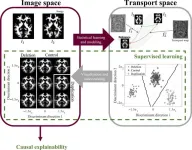(Press-News.org) Sodium-glucose cotransporter-2 (SGLT-2) inhibitors used to treat type 2 diabetes might prevent dementia, providing greater benefits with longer treatment, suggests a large study from Korea published by The BMJ today.
As this study was observational, the researchers note that the effect size could have been overestimated and say randomised controlled trials are now needed to confirm these findings.
According to the World Health Organization, the number of people with dementia globally is expected to reach 78 million by 2030 and type 2 diabetes is associated with a greater risk of developing dementia.
A recent study of over 65s with type 2 diabetes suggested a decreased risk of dementia associated with SGLT-2 inhibitors versus another type of diabetes drug, dipeptidyl peptidase-4 (DPP-4) inhibitors. But the effects on younger people and specific types of dementia (eg, Alzheimer’s disease, vascular dementia) remains unclear.
To address this, researchers used the Korea National Health Insurance Service database to identify 110,885 pairs of adults with type 2 diabetes aged 40-69 years who were free of dementia and started taking either an SGLT-2 inhibitor or a DPP-4 inhibitor between 2013 and 2021.
All participants (average age 62; 56% men) were matched by age, sex, use of the diabetes drug metformin, and baseline cardiovascular risk and were followed up for an average of 670 days to see who developed dementia.
Potentially influential factors including personal characteristics, income level, underlying risk factors for dementia, other conditions and related medicine use, were also taken into account.
Over the follow-up period, a total of 1,172 participants with newly diagnosed dementia were identified.
Dementia rates per 100 person years were 0.22 for those using SGLT-2 inhibitors and 0.35 for those using DPP-4 inhibitors, corresponding to a 35% reduced risk of dementia associated with use of SGLT-2 inhibitors compared with DPP-4 inhibitors.
The researchers also found a 39% reduced risk for Alzheimer’s disease, and a 52% reduced risk for vascular dementia associated with SGLT-2 inhibitors compared with DPP-4 inhibitors.
What’s more, the effect of SGLT-2 inhibitors seemed more pronounced with longer treatment duration. A 48% reduced risk of dementia was seen for more than two years of treatment versus a 43% reduced risk for two years or less.
This is an observational study so no firm conclusions can be drawn about cause and effect, and the authors note that details of health behaviours (eg, smoking and alcohol consumption) and duration of type 2 diabetes were not fully available.
However, they point out that this was a large study based on nationally representative data that included relatively younger people with type 2 diabetes, and results were highly consistent across subgroups.
As such, they say SGLT-2 inhibitors might prevent dementia, providing greater benefits with longer treatment, and they call for randomised controlled trials to confirm these findings.
This study reports promising results that have important implications for clinical practice as well as from a public health perspective, say researchers from Taiwan in a linked editorial.
They agree that further trials are needed to confirm these findings, and suggest that studies are also needed “to explore the underlying mechanisms of any neuroprotective effects of SGLT-2 inhibitors.”
As no cure currently exists for dementia and few effective treatment options are available, strategies that can potentially prevent onset are critically important, they write.
Given the substantial socioeconomic and public health burdens associated with both dementia and type 2 diabetes, they also recommend that clinical guidelines and healthcare policies should be updated regularly to incorporate latest best evidence on the potential benefits of SGLT-2 inhibitors, including reduced dementia risk.
END
Certain diabetes drugs might prevent dementia
But randomised controlled trials are needed to confirm these findings
2024-08-29
ELSE PRESS RELEASES FROM THIS DATE:
Lower HPV vaccination coverage among girls with mental health conditions
2024-08-29
Girls with mental illness or neurodevelopmental conditions are less likely than their peers to be vaccinated with the HPV vaccine that protects against future cervical cancer. This is according to a new registry study from Karolinska Institutet in Sweden published in The Lancet Public Health.
The study involved more than 115,000 girls covered by the Swedish school-based human papillomavirus (HPV) vaccination programme. The vaccine, which prevents cervical cancer, among other things, is offered to all children in Sweden and given by school health services.
Significant ...
Scientists discover how the body's killer cells attack cancer
2024-08-29
Scientists are on the verge of a cancer breakthrough after working out how the body’s immune system targets cells devastated by the disease.
A new study has discovered that our natural killer cells, from the immune system which protect against disease and infections, instinctively recognise and attack a protein that drives cancer growth.
The experts say that by hijacking this protein, known as XPO1, they may be able to activate more killer cells to destroy the disease.
Scientists from the University of Southampton, working with experts worldwide, led the study and now believe it could offer new ...
Interprofessional training in health sciences education has a lasting impact on practice
2024-08-29
Geriatrics experts have long known that collaboration is key to delivering quality, patient-centered care to older adults.
That’s why USC’s Interprofessional Education and Collaboration for Geriatrics (IECG) trains up to 150 students annually from seven health professions to teach the importance of teamwork in meeting the complex needs of the elderly.
Now, a study published in the Journal of Interprofessional Care highlights the long-term impact of IECG on USC health sciences graduates.
Researchers surveyed graduates one to three years after completing IECG to assess how the program influenced their practice. The findings were significant: 81% ...
Study reveals molecular mechanism behind MS and other autoimmune diseases
2024-08-28
New Haven, Conn. — More than two decades ago, a research team in the lab of David Hafler, a Yale researcher who at the time was at Harvard, discovered a type of T cell in humans that suppresses the immune system; they later found that these so-called regulatory T cells, when defective, are an underlying cause of autoimmune disease, specifically multiple sclerosis (MS). For many years, however, the mechanism behind this dysfunction has remained unclear.
In a new Yale-led study, a team of researchers finds that this loss of immune regulation is triggered by an increase in PRDM1-S, a protein involved in immune function, ...
To build a thriving electric vehicle market, prioritize equity and justice
2024-08-28
When it comes to purchasing and using electric vehicles (EVs), housing- and income-related factors significantly shape perceptions and preferences among potential buyers, finds a new study in Energy and Climate Change. This research, a collaboration between the Boston University Institute for Global Sustainability (IGS) and the U.S. Department of Energy’s National Renewable Energy Laboratory (NREL), is among the first to examine both EV adoption and charging infrastructure through an equity lens coupled with state-of-the-art original survey data.
Understanding the barriers to widespread EV adoption ...
Large language models can help detect social media bots — but can also make the problem worse
2024-08-28
An external study of Twitter in 2022 estimated that between a third and two thirds of accounts on the social media site were bots. And many of these automatons flooding social media are dispatched to sow political polarization, hate, misinformation, propaganda and scams. The ability to sift them out of the online crowds is vital for a safer, more humane (or at least more human) internet.
But the recent proliferation of large language models (known as "LLMs" for short), such as OpenAI’s ChatGPT and Meta’s Llama, ...
How beetle juice led to the discovery of a virus and solved the mystery of a superworm die-off
2024-08-28
Rutgers University-New Brunswick scientists have discovered a virus that caused a nationwide die-off of superworms, a common food for birds, reptiles, other pets and, more and more so, even for humans as an alternative protein source. In doing so, they pioneered a different way to search for and identify emerging viruses and pathogens in humans, plants and animals.
Using chopped up beetle carcasses forming a slurry and an electron microscope cooled by liquid nitrogen, the scientists reported today in Cell that they have discovered what they have titled Zophobas morio black wasting virus. The name is derived from ...
Leading computational scientist & oncology researcher Elana Fertig appointed new Director of the Institute for Genome Sciences
2024-08-28
University of Maryland School of Medicine (UMSOM) Dean Mark T. Gladwin, MD, announced today the appointment of Elana J. Fertig, PhD, FAIMBE, as the new Director of the School’s Institute for Genome Sciences (IGS). She is internationally-recognized for her work in integrating spatial multi-omics technologies with mathematical models to develop a new predictive medicine paradigm in cancer. Spatial technologies allow researchers to learn about any cell type inside of natural tissue, including gene activity ...
UVA research cracks the autism code, making the neurodivergent brain visible
2024-08-28
A multi-university research team co-led by University of Virginia engineering professor Gustavo K. Rohde has developed a system that can spot genetic markers of autism in brain images with 89 to 95% accuracy.
Their findings suggest doctors may one day see, classify and treat autism and related neurological conditions with this method, without having to rely on, or wait for, behavioral cues. And that means this truly personalized medicine could result in earlier interventions.
“Autism is traditionally diagnosed behaviorally but has a strong genetic basis. A genetics-first approach could ...
Marine engineering group to award ORNL researchers for innovative welding software
2024-08-28
Zhili Feng, a distinguished R&D staff member, and Jian Chen, a senior R&D staff member, in Materials Science and Technology Division at the Department of Energy’s Oak Ridge National Laboratory, will receive the Elmer L. Hann Award at the Society of Naval Architects and Maritime Engineers, or SNAME, Convention on Oct. 15 in Norfolk, Virginia. SNAME plays a crucial role in promoting excellence in marine engineering and naval architecture, supporting professionals through education, research and collaboration.
The award is presented to authors of the best paper on ship production delivered at a SNAME event. In September 2023, Feng and Chen presented “Develop ...
LAST 30 PRESS RELEASES:
ASU researchers to lead AAAS panel on water insecurity in the United States
ASU professor Anne Stone to present at AAAS Conference in Phoenix on ancient origins of modern disease
Proposals for exploring viruses and skin as the next experimental quantum frontiers share US$30,000 science award
ASU researchers showcase scalable tech solutions for older adults living alone with cognitive decline at AAAS 2026
Scientists identify smooth regional trends in fruit fly survival strategies
Antipathy toward snakes? Your parents likely talked you into that at an early age
Sylvester Cancer Tip Sheet for Feb. 2026
Online exposure to medical misinformation concentrated among older adults
Telehealth improves access to genetic services for adult survivors of childhood cancers
Outdated mortality benchmarks risk missing early signs of famine and delay recognizing mass starvation
Newly discovered bacterium converts carbon dioxide into chemicals using electricity
Flipping and reversing mini-proteins could improve disease treatment
Scientists reveal major hidden source of atmospheric nitrogen pollution in fragile lake basin
Biochar emerges as a powerful tool for soil carbon neutrality and climate mitigation
Tiny cell messengers show big promise for safer protein and gene delivery
AMS releases statement regarding the decision to rescind EPA’s 2009 Endangerment Finding
Parents’ alcohol and drug use influences their children’s consumption, research shows
Modular assembly of chiral nitrogen-bridged rings achieved by palladium-catalyzed diastereoselective and enantioselective cascade cyclization reactions
Promoting civic engagement
AMS Science Preview: Hurricane slowdown, school snow days
Deforestation in the Amazon raises the surface temperature by 3 °C during the dry season
Model more accurately maps the impact of frost on corn crops
How did humans develop sharp vision? Lab-grown retinas show likely answer
Sour grapes? Taste, experience of sour foods depends on individual consumer
At AAAS, professor Krystal Tsosie argues the future of science must be Indigenous-led
From the lab to the living room: Decoding Parkinson’s patients movements in the real world
Research advances in porous materials, as highlighted in the 2025 Nobel Prize in Chemistry
Sally C. Morton, executive vice president of ASU Knowledge Enterprise, presents a bold and practical framework for moving research from discovery to real-world impact
Biochemical parameters in patients with diabetic nephropathy versus individuals with diabetes alone, non-diabetic nephropathy, and healthy controls
Muscular strength and mortality in women ages 63 to 99
[Press-News.org] Certain diabetes drugs might prevent dementiaBut randomised controlled trials are needed to confirm these findings




